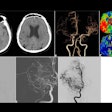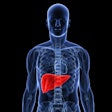
CT colonography (CTC) is not recommended for colorectal cancer screening, according to new guidelines published by the American College of Physicians (ACP) on July 31 in the Annals of Internal Medicine.
Instead, the ACP now recommends fecal immunochemical or high-sensitivity guaiac fecal occult blood tests, colonoscopy, or flexible sigmoidoscopy.
"The evidence review identified no eligible studies evaluating the effectiveness of CTC for [colorectal cancer] screening," wrote a team led by Amir Qaseem, MD, PhD, of the ACP in Philadelphia, PA, in the guidance.
The new recommendation also suggests that average-risk, asymptomatic adults should start colorectal cancer screening at age 50 -- counsel that differs from the American Cancer Society's guidance of starting colorectal cancer screening at age 45.
Colorectal cancer has the fourth highest incidence and second highest mortality rates among cancers in the U.S., the ACP said in a July 25 statement. The updated guidance is for average-risk adults who do not have a family history of colorectal cancer, a history of inflammatory bowel disease, genetic syndromes such as familial cancerous polyps, or personal history of previous colorectal cancer or benign polyps, the college said.
The new recommendation includes the following:
- Asymptomatic average-risk adults between the ages of 45 and 49 should not necessarily be screened. "The net benefit of colorectal cancer screening is much less favorable in average-risk adults between ages 45 and 49 years than 50 to 75 years," the ACP wrote.
- Colorectal cancer screening should be discontinued in asymptomatic average-risk adults older than 75 years or in asymptomatic average-risk adults with a life expectancy of 10 years or less.
- Clinicians should select a screening test for colorectal cancer in consultation with patients "based on a discussion of benefits, harms, costs, availability, frequency, and patient values and preferences," the ACP said. Possible screening tests include fecal immunochemical or high-sensitivity guaiac fecal occult blood test every two years, colonoscopy every 10 years, or flexible sigmoidoscopy every 10 years plus a fecal immunochemical test every two years.
- Clinicians should not use CT colonography, stool DNA, capsule endoscopy, urine, or serum screening tests to screen for colorectal cancer, according to the ACP.
An accompanying editorial written by Michael Bretthauer, MD, PhD, of the University of Oslo in Norway, and Yu-Xiao Yang, MD, of the University of Pennsylvania in Philadelphia -- both editors at the Annals of Internal Medicine -- acknowledged that the new guidance is "at odds with [U.S. Preventive Services Task Force] and American Cancer Society guidance in important ways and will spark debate in the U.S.," but that it is "more in line with international guidelines."
The American College of Radiology (ACR) was quick to release a critique of the new guidance, noting in a July 31 statement that CT colonography is "an accurate, safe, and minimally invasive test that does not require sedation, allows people to go back to their daily activities, and is a preferred option for many who otherwise may not be screened."
The college warned that recommending against the use of CTC "may negate effective screening gains" and disproportionately affect racial minorities, especially since death rates from the disease are 47% higher in Black men and 34% higher in Black women compared to their white counterparts, and that 19% of racial disparity in colorectal cancer deaths is due to less screening.
"The American College of Physicians (ACP) guidance against CT colonography use to screen for colorectal cancer represents a step backward -- particularly in underserved communities where screening rates are lower and [colorectal cancer] death rates are much higher," the ACR said in a July 31 statement. "ACP's guidance to start routine screening at age 50 rather than 45 as the American Cancer Society recommends may also hinder recent gains against the nation's third leading cancer killer. About a third of those who should be screened for CRC can't or won't get a colonoscopy. We need more testing options, not fewer."
The full article can be found here and the accompanying editorial can be found here.





















